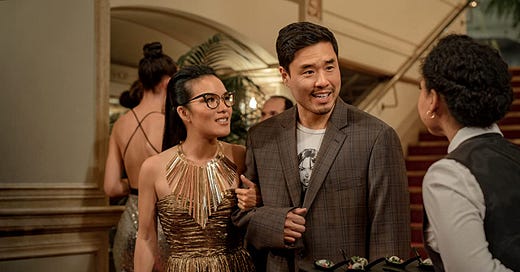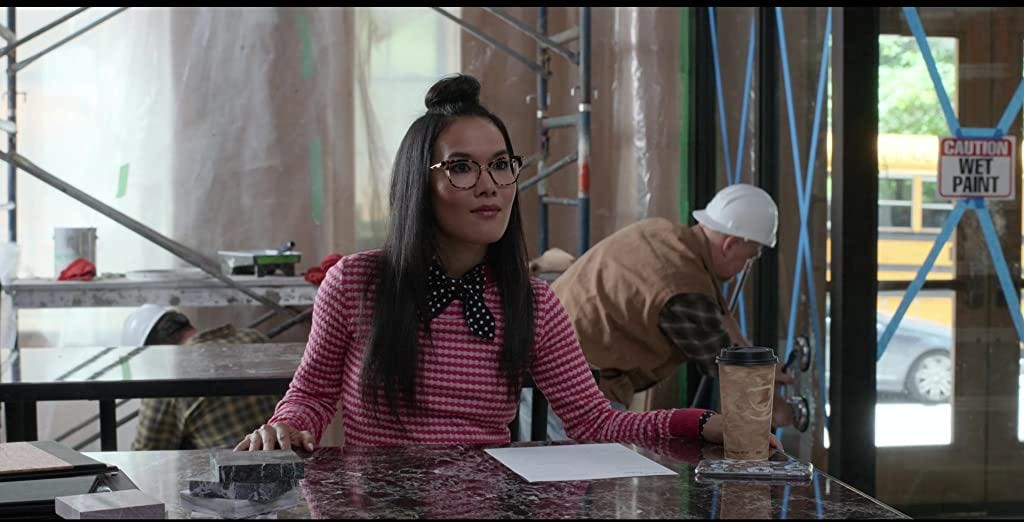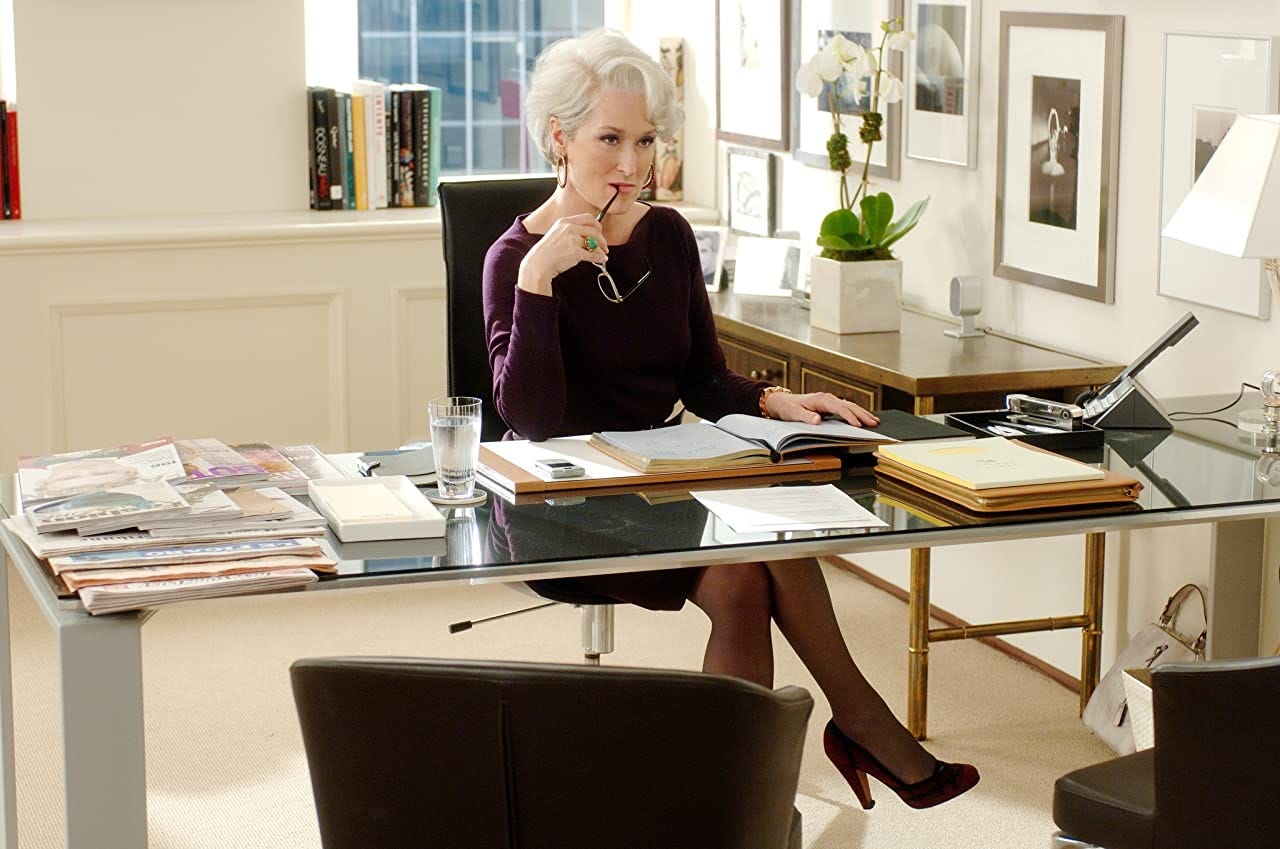There are two things that I’ll always associate the rom-com “Always Be My Maybe” with. One, it’s a movie that reminded me that Keanu Reeves is Asian-American. Two, it gave us a rare heroine who wears glasses throughout the movie for no other reason than just because.
Movies tend to have a weird relationship with glasses. It’s odd when you consider the fact that in the U.S., around 65 percent of adult consumers wear prescription glasses, though that figure might grow higher in the coming years because more children are becoming myopic. You wouldn’t know it from Hollywood movies, though, where glasses are often the exception, rather than the rule, and bespectacled main characters are few and far between.
Part of it seems to be logistics. You have to put on a special anti-reflective coating on the lenses and work with the lighting department to make sure the glasses don’t reflect their surroundings, i.e. the entire film crew. But a large part of it is connected to beauty norms. Conventionally, glasses are not seen as attractive, and when they do make an appearance in movies, there’s usually a gender imbalance.
Male characters, compared with female characters, are allowed to wear glasses more often. Those that do usually embody similar traits: They either have highly paid white-collar jobs or they’re associated with a certain bookishness. They’re lawyers, like Gregory Peck in “To Kill a Mockingbird” or Christian Bale in “American Psycho.” They’re professors, like Harrison Ford as Indiana Jones. They’re doctors. They’re scientists who have shrunk their kids. They’re chemistry teachers considering a career pivot to meth. They are a lot and a lot of writers.
Glasses are also meant to make people look more unassuming, so unassuming that they can, however improbably, serve as a disguise. Movies want us to believe that glasses are all one needs to look unrecognizable, for Superman to be Clark Kent.
Personally, I subscribe more to the belief of Etta in “Wonder Woman,” which is hot people are hot and there’s nothing you can do about it.
But Hollywood loves a glasses makeover for women. Have them switch from glasses to contacts in a makeover, and suddenly our female leads are jaw-droppingly good-looking, as it is in “The Princess Diaries” and “She’s All That.”
Glasses are rarely portrayed as adding to a woman’s beauty in movies. It’s something to get rid of in a makeover, not something to claim as a fashion accessory. Instead of glasses, young female characters are encouraged to embrace contacts, which mirrors the fact that in real life, two-thirds of contact lens wearers in the U.S. are women.
Another similar trope is the transformation scene in comic book movies, which has a female character grow more powerful after being imbued with superhuman powers. In the process, they also chuck their glasses and go from being a frumpy side character to a villain oozing often dangerous sexuality. It happens in Kristen Wigg’s transformation into Cheetah, Michelle Pfeiffer’s metamorphosis into Catwoman, and Uma Thurman’s rebirth as Poison Ivy. The equation is the same as it is in the makeover sequence: Women - glasses = hotness. Glasses are very much like Taylor Swift’s “Dress”: they exist only to be taken off.
Interestingly, the no-glasses rule seems to be more relaxed for older actresses. Get to a Diane Keaton or Meryl Streep level and you can wear glasses however much you like, a luxury not afforded to the actresses in their younger years. Hell, you can even make a snack out of wearing glasses, as Streep does.
This brings me back to another exception of the glasses rule, how glasses are utilized in “Always Be My Maybe.” In the movie, which was co-written by and stars Ali Wong and Randall Park, Ali’s character Sasha is never without her glasses. She sports as many as six different frames throughout the movie, according to Vulture’s interview with costume designer Leesa Evans, and each frame was chosen to go with her outfits and have a fashionable edge.
[I]t was fun, because we made the conscious decision that Ali would be wearing glasses the entire film. And that’s not a common decision for a lead actress. And so, you know, while we were doing that, we’re like, well, let’s have fun with it and let’s really say that that’s part of her. One of her main accessories that she always wears is glasses.
[Vulture]
The choice to have Sasha wear glasses would not be possible if not for the fact that Wong also wears glasses in real life, I believe. After one incident in college where she had left her contacts in for too long and her eyes were “messed up for a week,” Wong started wearing glasses exclusively, according to her memoir “Dear Girls.” Oversized, bold glasses are an integral part of the Ali Wong look, and it’s one we are familiar with from her Netflix specials.
As the co-writer and star of the movie, Ali Wong and her comedic persona are front and center in “Always Be My Maybe,” which may be why she is able to evade the glasses rule. “Always Be My Maybe” is a rom-com, sure, but it’s also very much a vehicle for Wong’s talents. When people watch the movie, a great number of them are specifically tuning in for her and her comedic performance.
We know Wong is not playing herself per se in a movie, but given that “Always Be My Maybe,” a Netflix movie, came off the heels of Wong’s two Netflix comedy specials “Baby Cobra” and “Hard-Knock Wife,” it’s not far-fetched to imagine people wanting to watch the movie and get more of Ali Wong after completing the specials. I know I did. I also know that I would probably have been a bit thrown off if she didn’t wear glasses in “Always Be My Maybe” because that’s her trademark look and I’m watching the movie for Ali Wong the Comedian, and not necessarily for Ali Wong the Actress, which would likely require her to subjugate her personal style in order to disappear into a character.
The foregrounding of glasses in “Always Be My Maybe” is unique in that it provides a space where glasses can be a fashion accessory, like a watch or a necklace, and not a hindrance to one’s stylistic expression. And as radical as it might be to think about movies where characters, especially female characters, can freely wear glasses, it’s not even that radical when you think about it.
We already have plenty of instances where a certain type of eyewear is considered fashionable in movies. Cinema loves a pair of sunglasses: There are so many iconic moments that come from characters wearing shades, such as “Breakfast at Tiffany’s,” “Top Gun,” “Men in Black,” “The Matrix,” and “The Big Lebowski.” Why can’t the case be made for glasses too? Wouldn’t it be great if a character didn’t have to be nerdy or bookish or in desperate need of a makeover for a movie to justify them wearing glasses? Couldn’t they just wear glasses cause it’s cool?







